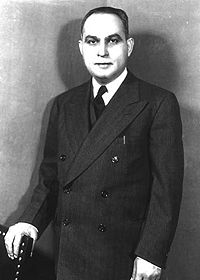
Bolívar Pagán
Encyclopedia

Pagán was born in Guayanilla, Puerto Rico
Puerto Rico
Puerto Rico , officially the Commonwealth of Puerto Rico , is an unincorporated territory of the United States, located in the northeastern Caribbean, east of the Dominican Republic and west of both the United States Virgin Islands and the British Virgin Islands.Puerto Rico comprises an...
. He received his primary education in the public schools of Adjuntas, and went to secondary school in the city of Ponce
Ponce, Puerto Rico
Ponce is both a city and a municipality in the southern part of Puerto Rico. The city is the seat of the municipal government.The city of Ponce, the fourth most populated in Puerto Rico, and the most populated outside of the San Juan metropolitan area, is named for Juan Ponce de León y Loayza, the...
. While still in school in Ponce, he was a contributor to the newspapers El Día
El Nuevo Día
El Nuevo Día is a Puerto Rican newspaper based in Guaynabo, Puerto Rico and distributed daily throughout Puerto Rico and some parts of the United States.- History :...
, Nosotros, Renacimiento, and Puerto Rico Ilustrado and editor to both La Idea and La Aurora. In 1919 Pagán became the vice president of the Socialist Party of Puerto Rico.
In 1921 he graduated with a law degree from the University of Puerto Rico
University of Puerto Rico
The University of Puerto Rico is the state university system of Puerto Rico. The system consists of 11 campuses and has approximately 64,511 students and 5,300 faculty members...
at Rio Piedras; the same year he was admitted to the bar and began to practice law in San Juan. The following year he served as judge of Fajardo, Puerto Rico.
In 1924, Pagán ran unsuccessfully as a Socialist Party candidate for election to the Puerto Rican Senate. The following year, he began a four-year tenure as city treasurer of San Juan. In 1928, he ran again for the Puerto Rican Senate, but was not elected. He succeeded on his third try, and served as a member of the Puerto Rican Senate from 1933 until 1939, rising to leadership positions such as president pro-tempore and majority floor leader. While in the Puerto Rican Senate, he worked on legislation of social and cultural importance, such as universal suffrage, workers' compensation, and the creation of the Instituto de Literatura Puertorriqueña. He also served as city manager of San Juan, Puerto Rico in 1936 and 1937.
In 1939 Pagán was appointed Resident Commissioner to the U.S. House of Representatives by the Governor of Puerto Rico, William B. Leahy, to fill the vacancy caused by the death of Pagán's father-in-law, Santiago Iglesias
Santiago Iglesias
Santiago Iglesias Pantín , a supporter of statehood for Puerto Rico, was the Resident Commissioner of Puerto Rico in the U.S...
. In 1940, he was elected Resident Commissioner under the auspices of a coalition
Coalition (Puerto Rico)
The Coalition was an electoral alliance in Puerto Rico.The Coalition was formed in 1924, composed of the Republican Party and the Socialist Party. It was generally in favor of statehood and is generally regarded as representing the interests of United States sugar corporations. It held a majority...
between the Socialist Party and the Republican Union Party
Republican Union
The Republican Union was a pro-statehood political party in Puerto Rico.The Republican Union was founded in 1932 from the merging of the Pure Republican Party and the conservative wing of the Alianza...
.
In the 78th Congress Pagán was appointed to serve on the Committees on Agriculture, Labor, and the Territories. The following Congress, in addition to the previous committee assignments, he was appointed to the Committees on Insular Affairs, Military Affairs, and Naval Affairs. In Congress he continued the work of his father-in-law and successfully advocated the extension of social security benefits to Puerto Rico, and the application of workers' compensation laws to the Island.
Pagán pushed for Puerto Ricans to elect their own governors. He introduced a number of bills to achieve this, but they were not passed during his tenure. In addition, he brought to the attention of Congress the dissatisfaction of some Puerto Ricans with Governor Rexford G. Tugwell. Pagán returned to Puerto Rico, and was again elected to the Senate of Puerto Rico, was reelected in 1948, and served until 1953.
He resumed his law practice in San Juan until his death on February 9, 1961. He was burried in Puerto Rico Memorial Cemetery located in Carolina
Carolina, Puerto Rico
Carolina is a city located in the northern part of Puerto Rico, bordering the Atlantic Ocean; it lies north of Gurabo and Juncos; east of Trujillo Alto and San Juan; and west of Canóvanas and Loíza. Carolina is spread over 12 wards plus Carolina Pueblo...
.
Major publications
Pagán, Bolívar. Historia de los Partidos Politicos Puertorriqueños 1898-1956.Librería Campos, San Juan, 1959.See also
- List of famous Puerto Ricans

